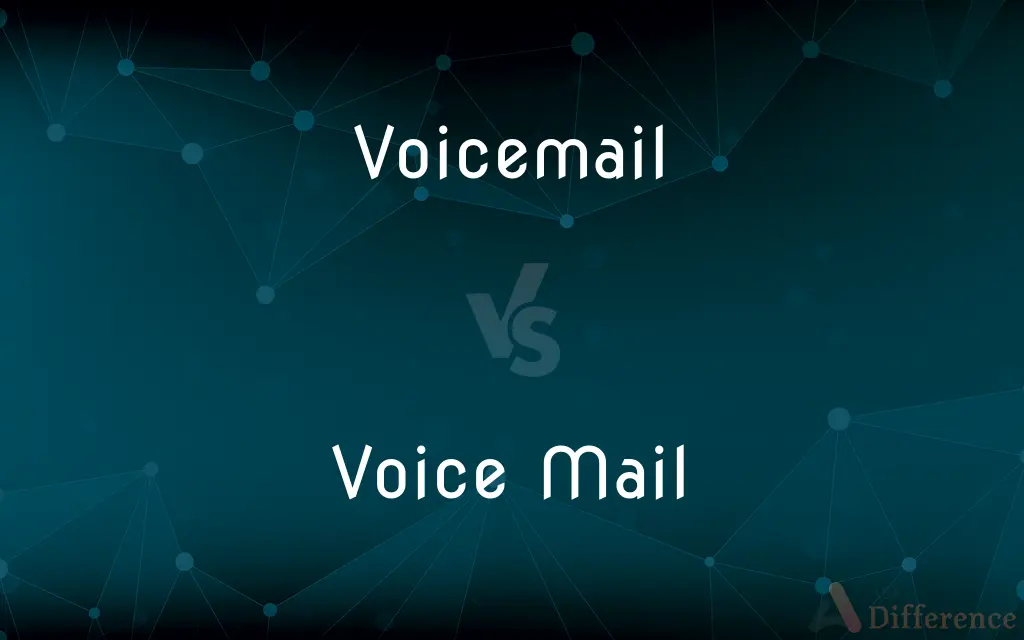Voicemail vs. Voice Mail — What's the Difference?
By Tayyaba Rehman — Published on November 12, 2023
Voicemail and Voice Mail both refer to a system for recording and storing phone messages, but "Voicemail" is the modern, closed compound form, while "Voice Mail" is the older, open compound form.

Difference Between Voicemail and Voice Mail
Table of Contents
ADVERTISEMENT
Key Differences
Voicemail and Voice Mail both refer to a system that allows callers to leave messages when the recipient is unavailable.
Voicemail, as a closed compound word, has become more prevalent in contemporary usage. It's the form commonly seen on smartphones, apps, and modern communication platforms. Voice Mail, as an open compound word, harks back to the early days of the technology and may be found in older documentation or systems.
Technically speaking, there's no functional difference between Voicemail and Voice Mail.
Both words indicate a system that records, stores, and allows playback of voice messages. Voicemail, however, as the more modern form, aligns with the evolution of language where compound words often merge over time. Voice Mail remains a reminder of the term's origins.
In daily conversation, Voicemail is now more frequently used.
ADVERTISEMENT
It's succinct and has become the default terminology for the younger generation. Voice Mail might be used by those who became acquainted with the technology in its nascent stages or in more formal or older contexts.
When considering documentation or formal writing, it's essential to be consistent.
If you choose to use Voicemail, it's advisable to use it throughout your document. The same goes for Voice Mail. It ensures clarity and professionalism.
Comparison Chart
Spelling
Closed compound
Open compound
Modern Usage
More common
Less common
Origin
Evolved from Voice Mail
Original term
Stylistic Consistency
Seen in contemporary contexts
Might be seen in older, formal contexts
Evolution
Reflects the natural merging in language
Represents the term in its initial stages
Compare with Definitions
Voicemail
A feature on most phones allowing for message retrieval.
My Voicemail notification just popped up.
Voice Mail
A service provided by telephone service providers to record voice messages.
I couldn't reach her, so I left a message on her Voice Mail.
Voicemail
A virtual inbox for voice messages.
My Voicemail is full; I need to clear it.
Voice Mail
An audio mailbox connected to a phone line.
Callers can leave messages on the Voice Mail when the line is busy.
Voicemail
A digital system that records and stores voice messages from missed calls.
I'll check my Voicemail for any missed messages.
Voice Mail
A communication feature that stores spoken messages.
The company's Voice Mail system was updated to store more messages.
Voicemail
An alternative to answering a call in real time.
If I'm busy, just leave a message on my Voicemail.
Voice Mail
A precursor to modern Voicemail systems.
The Voice Mail system was considered revolutionary in its time.
Voicemail
An electronic mailbox associated with a phone number.
He left a detailed message on my Voicemail.
Voice Mail
An older term for a system of storing voice recordings from callers.
The office still uses the term Voice Mail for their messaging system.
Voicemail
Any of various systems for answering telephone calls and recording and saving messages.
Voicemail
A recorded message left by a caller on a voicemail system or an answering machine.
Voicemail
(uncountable) A computerized interactive system for storing, processing and reproducing verbal messages left through a conventional telephone network.
Voicemail
An individual message on such a system.
Voicemail
To leave a message on voicemail.
Common Curiosities
Are Voicemail and Voice Mail the same thing?
Yes, they both refer to a system for recording and storing phone messages.
Why do we have two terms: Voicemail and Voice Mail?
"Voice Mail" is the older, open compound form, while "Voicemail" evolved as a closed compound version.
Is Voicemail more commonly used now?
Yes, Voicemail is more commonly used in contemporary contexts.
Can I use Voice Mail in my new smartphone?
The term on your smartphone will likely be "Voicemail," but it serves the same purpose as Voice Mail.
Is one term more modern than the other?
Yes, Voicemail is the more modern, closed compound form.
Is Voice Mail outdated?
While the term "Voice Mail" is older, the function it describes isn't outdated.
Does the functionality differ between Voicemail and Voice Mail?
No, the functionality remains the same; only the terminology differs.
Why did Voicemail evolve from Voice Mail?
Language naturally evolves, and compound words often merge over time.
Do all countries use Voicemail more than Voice Mail now?
Most English-speaking countries have seen a shift to "Voicemail," but variations might exist based on regional preferences.
Do all modern phones come with Voicemail?
Most modern phones have a Voicemail feature, but its availability might depend on the service provider.
Is Voice Mail only related to phones?
Primarily, but Voice Mail systems can also be integrated into other communication platforms.
How do I know if my phone uses Voicemail or Voice Mail?
Check the phone's interface or user manual. However, functionally, they serve the same purpose.
Should I use both terms interchangeably in a document?
For clarity and consistency, stick to one term throughout a document.
Were there any technological changes that prompted the shift in terms?
No major technological shift caused the change; it was more about linguistic evolution.
Is there a difference in spelling in British English?
Both American and British English recognize the shift from "Voice Mail" to "Voicemail," but usage might vary.
Share Your Discovery

Previous Comparison
Ethylene Glycol vs. Polyethylene Glycol
Next Comparison
Kung Pao vs. SzechuanAuthor Spotlight
Written by
Tayyaba RehmanTayyaba Rehman is a distinguished writer, currently serving as a primary contributor to askdifference.com. As a researcher in semantics and etymology, Tayyaba's passion for the complexity of languages and their distinctions has found a perfect home on the platform. Tayyaba delves into the intricacies of language, distinguishing between commonly confused words and phrases, thereby providing clarity for readers worldwide.















































